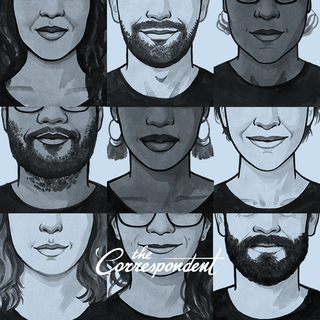When Angela Saini’s son was born, Barack Obama was still president of the United States. She was hopeful. Surely her son would grow up in a better world – possibly even a world without prejudice, without discrimination, without delusional theories about “race”.
Five years later, in the Autumn of 2019, she’s not nearly as optimistic. “In just a few years, far-right and anti-immigrant groups have once more become visible and powerful across Europe and the US,” she writes in her latest book, Superior: The Return of Race Science.
She mentions Poland, where nationalists march under the slogan “Pure Poland, white Poland”; Germany, where far-right populist party Alternative für Deutschland received just over 12% of the votes in 2017; and Steve Bannon, who stirred up far-right nationalists in France in 2018 with the words: “Let them call you racist, let them call you xenophobes, let them call you nativists. Wear it as a badge of honour.”
Saini (1980) is a British science journalist and author; her previous books were Geek Nation and Inferior. Her third book, Superior, is about race science. In writing it, she interviewed biologists, geneticists and other scientists who are researching differences between people.
The conclusion is clear: race doesn’t actually exist. At least, not in a biological sense. Although race may be fiction, discrimination is all too real.
Some researchers are still measuring skull shape and size
Not everyone is willing to accept that race is just a social construct. In her book, Saini describes a group of scientists who stubbornly insist that the differences between “races” are a biological reality. According to these researchers, some ethnic groups are allegedly smarter or more athletic than others. Some are even still measuring the shape and size of human skulls. It’s all pseudo-scientific nonsense, as Superior demonstrates.
But in the current political climate, Saini fears, such ideas provide “scientific” support for dangerous political ideologies. It’s far too easy for such researchers to link such pseudo-science to official policy. They start by asserting that African-Americans are genetically less intelligent. So why, they then ask, would anyone invest in educational programs that aim to help them learn? And why would you allow immigrants to enter the country from nations that have a low average IQ?
Saini does not shy away from referencing the Holocaust. Intellectual racism thrived in Nazi Germany. It has almost vanished since then – but it’s not quite gone. “Those with dangerous ideas about ‘human nature’ and even more dangerous prescriptions for our problems are always content to bide their time,” Saini says in the afterword to Superior. “However dead you might think it is, it needs only a little water, and now it’s raining.”
So what does race science look like across history? And what does that history teach us about the present? I asked Saini those questions. What follows is our conversation, which has been lightly edited for clarity. You can also listen to my interview with Saini here.

The rise and fall of race science
The subtitle of your book is The Return of Race Science. Where had race science gone, and how did it return?
I can’t say it really ever went away, because these ideas have been with us for a long time and they never completely disappear. But what has returned is a certain way of thinking that harnesses scientific racism, and that has infiltrated politics.
You described that such ideas were much more mainstream in the past.
We have to remember that today we think of racism as a bad thing. It’s a terrible thing to call someone a racist, and it can be career-ending for some people. But race science was completely acceptable in the past. In the 19th century, even the early 20th century, eugenics was popular, even fashionable. It was seen as a utopian, scientific, rational way of improving society.
That was largely changed by the events of the second world war. The Nazi programme of racial hygiene was the big wake-up call to the scientific community – not only due to the moral vacuity of this idea but also how it didn’t make any sense scientifically.
Genetics and biology have shown that we are remarkably homogeneous as a species. We have less diversity as a species than chimpanzees, and we cannot be divided into distinct genetic subgroups. We overlap massively. These boundaries that we think of as different races are actually really, really fuzzy to the point of meaninglessness.
So race doesn’t really exist, biologically speaking?
When scientists say that race is a social construct, what they mean is: where we draw boundaries is really arbitrary. The way I like to explain it is: I have a close genetic relationship to my sisters and my son and my parents. I have a weaker one to my cousins and my grandparents and a weaker one still to my further extended family. When you get up to the level of the state and country and continent, that relationship gets fuzzier and fuzzier.
So where do you want to draw the lines of race? It may be based on something very superficial like skin colour, but even within groups, skin colour will vary widely. What you define as black or white is completely different depending on where you live and when. It’s only relatively recently that Italians and Greeks were considered white in America.
So the ideas of scientists in the 19th and early 20th century turned out to be wrong. How harshly can we judge them?
I think there’s two things we have to bear in mind. One, even then, there were people within the scientific community saying: "This doesn’t make any sense, this isn’t good science, and morally it’s problematic. We shouldn’t be thinking about people in this way."
The other thing is that when we judge individuals harshly, we forget how mainstream these ideas were. Take Francis Galton, where the word eugenics originated from. He was a racist and sexist, but the dangerous and problematic ideas he had were popular among so many people. Take Virginia Woolf and Marie Stopes, people who we now see as feminist icons; they were eugenicists.
I think that none of us are immune from thinking this way. If it happened then, why could it not happen now? It’s not just the case that there is a certain type of bad person and all the rest of us are just good people.
Race science moved to the margins
In your book, you show that the ideas and ideologies of racial doctrine never went away completely after the second world war.
That’s right. The people who clung to eugenics and race science got together and formed their own networks. They had their own journals and their own sources of funding from political actors who were, for instance, interested in segregation.
Occasionally, they would bubble up into the mainstream. In the 1960s, there were people like the psychologist Arthur Jensen who believed that black Americans were naturally less intelligent than white Americans. There was William Shockley, the physicist, who thought that black women should be sterilised. There was the publication of The Bell Curve in the 1990s, which relied very heavily on the work of the people I’ve just described here. And now we’re seeing it again in mainstream politics to some extent, and certainly in the "alt right".
What are the interests of the people who finance research studies like these?
The key figure [in race science] was Wickliffe Draper, an American textile multimillionaire. He inherited a lot of money and was also deeply wedded to maintaining segregation in the United States. He sought out intellectuals that could give him ballast for his racist views. You see this throughout history: people wanting to justify their prejudices as not being prejudiced at all, but based on fact.
Wickliffe funded the Mankind Quarterly [in 1961], which became the journal of race scientists, and he funded these individuals to the tune of millions. His fund, The Pioneer Fund, is now empty, but in those 50 years or so, it has done an incredible amount of damage.
Are some topics too dangerous to be studied by science? Like IQ differences related to skin colour?
I personally am all for academic freedom. I don’t have an issue with any kind of research. The reason that kind of research isn’t done is because it sounds ridiculous. It’s like saying: "Should we research IQ differences by height? Or shoe size?"
I’m not afraid of dangerous research at all. I think that you should do it, but there are reasons that people don’t ask funding bodies to investigate whether the Earth is flat.
So how big is the group of scientists that are still studying this?
Well, I have to emphasise, none of them are mainstream scientists; there are no mainstream scientists who do this. They are people on the very margins of academia and sometimes outside it. They tend to be political scientists, economists, psychologists, people interested in intelligence research. Very much marginal to the mainstream, but very active.
Are they consciously thinking: “OK, we’re in favour of segregation. Let’s find facts to back it up!” Or is it happening on a more subconscious level?
When you ask these people for scientific evidence, what they say is: "Just look around you, just look at the differences that we see!" That’s not very scientific. That was the argument people used in the 19th century to justify women not getting the vote. "Look around you, women aren’t doing what men are doing." Well, if you oppress women, then frankly that’s what you’re going to get. So I struggle with understanding how it could be subconscious when you’re clearly resorting to such circular arguments.
Even Nature is described as ‘anti-science’
I was looking at the website of Mankind Quarterly, and I saw they also had a review of your book. Did you read it?
I haven’t read it, because my internet service provider blocks Mankind Quarterly.
I couldn’t read everything, but I have the abstract. Do you want to hear it?
What do they say?
"Saini’s book assails ‘race science’, which is presented as the root cause of racism in modern societies. The content of this science is either not described at all or is grossly misrepresented. The book is nevertheless valuable because it reveals the cognitive structure of one type of anti-science ideology that is influential in modern societies. This ideology turns Enlightenment philosophy on its head, claiming that science and reason create rather than challenge prejudice."
(Saini laughs.)
I do know the person who wrote that, Gerhard Meisenberg; I interviewed him for my book. He doesn’t come across well in the interview, but entirely through his own fault because he’s just saying such crazy things. But then, even the publications I write for have been described by this group of people as anti-science. That includes Nature Magazine. If you’re going to call Nature anti-science, then the whole of science is anti-science, thank you very much.
In your afterword, you write: “Wear your identity lightly.” How does one do that?
Kwame Anthony Appiah, a British-Ghanaian philosopher, says: "Identity shifts all the time." And this is why I like to think about it. My identity doesn’t actually belong to me, it belongs to the people who are looking at me.
‘My identity doesn’t actually belong to me, it belongs to the people who are looking at me’ – Kwame Anthony Appiah
When I go to India – where my parents were born – that’s when I am the most British. But in parts of Britain, they see me quite clearly as Indian. We can understand biological identity – and even cultural and social identities for that matter – as something of a cloak that we wear rather than something that is rooted in us.
That’s not to say that you can just change identity at the drop of a hat. Like I said, it belongs to other people. They will see you as they see you, and there’s not a lot you can do about that.
Since the publication of your book, you and your family have been harassed online by neo-Nazis and white supremacists. Do you wish you hadn’t written it?
No, I just had to write it. We have to challenge what they’re trying to do. We are, I fear, already losing.
This interview was originally published on De Correspondent. Translation of the introductory sections and adaptation of the condensed interview are provided by Joy Phillips.
 Want to stay up to date?
Follow my newsletter to receive notes, thoughts, or questions on the topic of numeracy.
Want to stay up to date?
Follow my newsletter to receive notes, thoughts, or questions on the topic of numeracy.Dig deeper
 What racism really is (hint: it’s not your attitude or belief)
Our obsession with racist attitudes can obscure the fact that racism is a system, devised to justify slavery, with a hierarchy that still defines the value of our lives today – that’s why you can be racist without being a racist.
What racism really is (hint: it’s not your attitude or belief)
Our obsession with racist attitudes can obscure the fact that racism is a system, devised to justify slavery, with a hierarchy that still defines the value of our lives today – that’s why you can be racist without being a racist.


